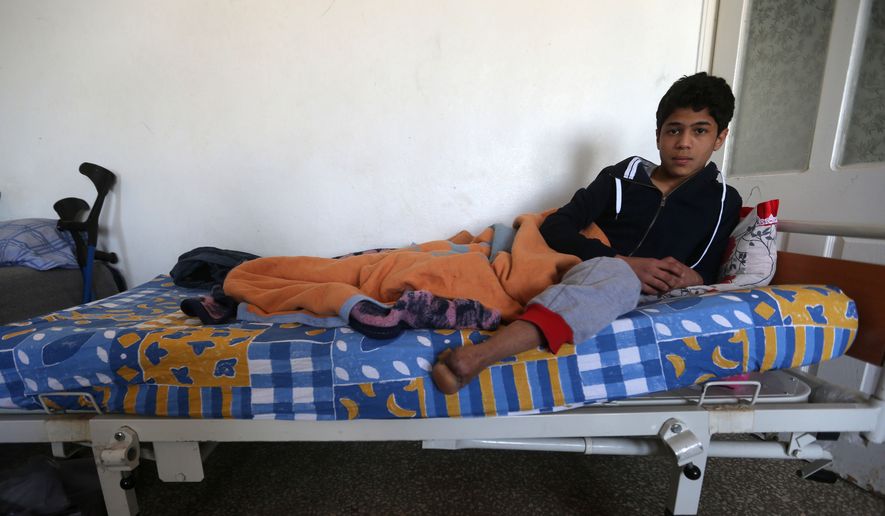KILIS, Turkey (AP) — Sitting up in bed, 16-year-old Anas Baroudi lifts up an orange blanket to show where his left foot used to be, before he lost it almost three years ago in Syria’s civil war.
“It’s not painful,” the Syrian teenager says quietly as he covers the leg again.
Lying in the next bed is Hassan, 26, a rebel fighter who lost his right eye and mobility in his right leg when a tank shell struck close to him on the front lines of Aleppo.
They both tease 23-year-old Khaled Qatrib, another Syrian war amputee who is sharing their room, about being a “Facebook addict,” with a smartphone seemingly attached to his hand.
The mood is relatively upbeat among the young Syrian men, their lives forever scarred by war, at the Dar Al-Salameh center for recovery and physiotherapy in the Turkish border town of Kilis.
The men follow the news from their homeland on TV and via social media, and encourage each other as they wait for the day when they can return to Syria, once they get their prosthetics and adjust to their new lives.
“This is a temporary home where Syria’s many wounded people who have nowhere else to go can stay until they recover,” said Yasser Abu Ammar, a Syrian physician. The center is one of several in the border area that were established to help deal with the massive number of wounded streaming in from the war next door.
Syria’s conflict, which entered its fifth year last month, has killed more than 220,000 people and wounded close to a million. An untold number of those — there’s no reliable estimate — suffered traumatic injuries that have left them physically disabled. Turkey, a major supporter of the rebels fighting to topple Syrian President Bashar Assad, has served as a staging area for the fighters and is also the place where many come to rest and recover.
The two-story building in Kilis is less than an hour’s drive from Syria’s contested northern city of Aleppo and had been receiving a steady stream of people with traumatic injuries asking to stay. The number dropped sharply last month, when Turkey closed the crossing with Syria as a security precaution.
At the center, only a kilometer (half mile) away from the border crossing, patients share the pain of displacement and loss.
Baroudi was wounded in the leg by a drive-by shooting in mid-2012 as he was taking part in a demonstration against Assad in in the central city of Homs.
“When I came to, there was still shooting everywhere, so I crawled a long way to safety, dragging my wounded leg with me,” he said.
His leg developed gangrene and his foot was amputated at a nearby hospital. He moved from one location to another across Syria’s rebel territory until his brother and friends brought him to Kilis last month.
Baroudi is now waiting to be fitted with a prosthetic, which he hopes will be ready in the next few weeks. His parents are trapped in the Homs neighborhood of Waar, which has been besieged by government forces for two years, and he plans to go stay with his brother in Istanbul.
One day, he would like to resume school, to become a lawyer. “I want to defend people,” he said timidly.
The others in the room chuckle at the teenager’s ambition.
Hassan, who fought with an Islamic rebel group in Aleppo, said the only thing he wants to do is return to the front lines, even though he has lost an eye and a leg.
“Maybe I cannot fight anymore, but I still want to do something to serve the jihad and the mujahedeen,” he said of the “holy war” against Assad.




Please read our comment policy before commenting.